[fusion_builder_container hundred_percent=”no” equal_height_columns=”no” menu_anchor=”” hide_on_mobile=”small-visibility,medium-visibility,large-visibility” class=”” id=”” background_color=”” background_image=”” background_position=”center center” background_repeat=”no-repeat” fade=”no” background_parallax=”none” parallax_speed=”0.3″ video_mp4=”” video_webm=”” video_ogv=”” video_url=”” video_aspect_ratio=”16:9″ video_loop=”yes” video_mute=”yes” overlay_color=”” overlay_opacity=”0.5″ video_preview_image=”” border_size=”” border_color=”” border_style=”solid” padding_top=”” padding_bottom=”” padding_left=”” padding_right=””][fusion_builder_row][fusion_builder_column type=”1_1″ layout=”1_1″ background_position=”left top” background_color=”” border_size=”” border_color=”” border_style=”solid” border_position=”all” spacing=”yes” background_image=”” background_repeat=”no-repeat” padding=”” margin_top=”0px” margin_bottom=”0px” class=”” id=”” animation_type=”” animation_speed=”0.3″ animation_direction=”left” hide_on_mobile=”small-visibility,medium-visibility,large-visibility” center_content=”no” last=”no” min_height=”” hover_type=”none” link=””][fusion_text] Our DNAs (deoxyribonucleic acid) hold important genomic information which determines the physiological processes of our body, predisposition and causes of diseases, our personality traits, and ultimately our health. Personalised medicine is the application of genomic and molecular data in delivering healthcare based on individualised medical diagnostics and interventions to achieve optimum illness and wellness management. Precision medicine, a subset of personalised medicine, is an emerging medical discipline referring to drug selection based on individualised genetic determinants that regulate drug pharmacokinetics and pharmacodynamics. 23-25 July, 2019 – The Institute for Research, Development, and Innovation (IRDI) from the International Medical University (IMU) in collaboration with Malaysian Genomics Resource Centre (MGRC) and Perdana University had successfully organised a Technical Hands-on Workshop on Data Science and Computational Precision Medicine at IMU’s main campus in Bukit Jalil. The main purpose of this workshop was to present current efforts towards computational precision medicine. At this workshop, the participants had opportunities to have hands-on learning by conducting data analyses using computational databases. [/fusion_text][fusion_table]
| There were three distinguished speakers in this workshop: |
|---|
| Dr Pawel Suwinski, a molecular geneticist from Malaysian Genomics Research Center |
| Dr Adaikalavan Ramasamy, a principal investigator from Singapore Institute for Clinical Sciences, A-STAR |
| Prof Dr Leong Chee Onn, Deputy Director of Research from IMU’s IRDI. |
[/fusion_table][fusion_text] 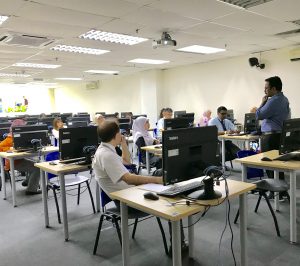
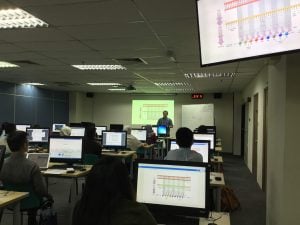
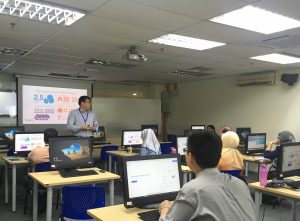 [/fusion_text][fusion_table]
[/fusion_text][fusion_table]
| The topics covered in this 3-days workshop were: |
|---|
| • Algorithms and advanced informatics for genome analysis |
| • Benchmarks, tools and applications in genomic and transcriptomic analyses |
| • Genome mutation interpretation |
| • Systems biology of signalling pathways; from data to mechanisms and targets |
| • Personalising therapies using DNA sequencing |
[/fusion_table][fusion_text] 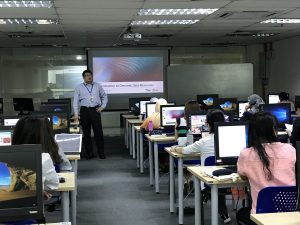
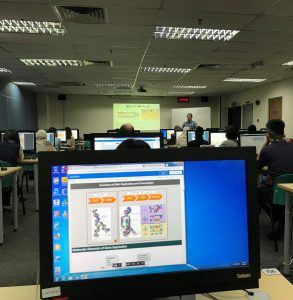
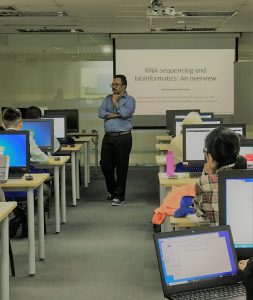 The workshop was well attended by faculty members and students from IMU as well as other institutions such as Universiti Kebangsaan Malaysia (UKM), Universiti Teknologi Malaysia (UTM), AIMST University, and MYGENOME. Truly, this workshop provided insights on how integrations of genomic data and utilisation of computational precision medicine result in better understanding of the impact of genetic variants on the pathogenesis of chronic and lifestyle induced diseases. No doubt the information generated can help to tailor effective prevention interventions and treatments for existing medical conditions. [/fusion_text][/fusion_builder_column][/fusion_builder_row][/fusion_builder_container]
The workshop was well attended by faculty members and students from IMU as well as other institutions such as Universiti Kebangsaan Malaysia (UKM), Universiti Teknologi Malaysia (UTM), AIMST University, and MYGENOME. Truly, this workshop provided insights on how integrations of genomic data and utilisation of computational precision medicine result in better understanding of the impact of genetic variants on the pathogenesis of chronic and lifestyle induced diseases. No doubt the information generated can help to tailor effective prevention interventions and treatments for existing medical conditions. [/fusion_text][/fusion_builder_column][/fusion_builder_row][/fusion_builder_container]

